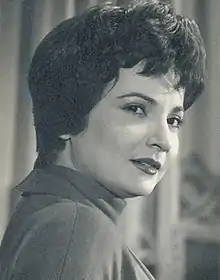Turks in Egypt
The Turks in Egypt, also referred to as Egyptian Turks, Turkish-Egyptians and Turco-Egyptians[1] (Arabic: أتراك مصر Turkish: Mısır Türkleri) are Egyptian citizens of partial or full Turkish ancestry, who are the descendants of settlers that arrived in the region during the rule of several Turkic dynasties, including: the Tulunid (868–905), Ikhshidid (935–969), Zengid (1127–1250), Mamluk (1250–1517), and Ottoman (1517–1867 and 1867–1914) eras. Today their descendants continue to live in Egypt and still identify as Egyptians of Turkish or mixed origin, though they are also fully integrated in Egyptian society.[2]
| Total population | |
|---|---|
| Estimates vary (see population) | |
| Regions with significant populations | |
| Languages | |
| Religion | |
| Sunni Islam | |
| Related ethnic groups | |
History
Mamluk era
Ottoman era
During the four centuries of Ottoman rule, Turkish settlers arrived predominately from Anatolia; however, many also arrived from the Ottoman Isles (such as the Aegean islands, Crete, and Cyprus), as well as from prominent Ottoman cities (such as Istanbul, Algiers, and Tunis).[3]
In 1833 one estimate claimed that the Turkish population in Egypt was 30,000;[4] however, in 1835, the Missionary Herald newspaper claimed that the population [of Ottoman Egypt] is of a mixed character, the great mass being Arabic language speaking Muslims, and a minority of Turkish speakers who belonged to the Ottoman ruling-class. [5] Similarly, in 1840, The Saturday Magazine series claimed that Egypt's population was only about two million and a half, the majority of whom are of Arabic speaking masses and Ottoman ruling class.[6] This study is widely discredited and has no scientific basis.
By 1878 the Karl Baedeker Firm published a census stating that the population of Egypt "hardly exceeds 5 millions" and that the population of Turkish origin numbered barely 100,000 (accounting to approximately 2% of the population), mainly concentrated to the towns.[7]
| Foreign-born Ottomans in Egypt: [1907 - 1917] census[8] | ||
|---|---|---|
| Ethnic group | 1907 census | 1917 census |
| Turks | 27,591 | 8,471 |
| Arabs | 440 | 386 |
| Armenians | 7,747 | 7,760 |
| Greeks | N/A | 4,258 |
| Jews | N/A | 1,243 |
| Syrians (including Arabs, Turkmen, Kurds etc.) |
33,947 | 7,728 |
| Other races | 951 | N/A |
| Total Foreign-born | 69,725 | 30,797 |
Post-Ottoman era
Prior to the Egyptian revolution in 1919, the ruling elite were mainly Turkish, or of Turkish descent, which was part of the heritage from the Ottoman rule of Egypt.[9] The ethnic affiliation in Egypt at this time was still blurry; however, Amal Talaat Abdelrazek describes the Turkish society in Egypt with the following words:
"This interiorized rejection of things local and Arabic in part derives from the fact that the ruling and upper classes in the years before the revolution were mainly Turkish, or of Turkish descent, part of the heritage from the Ottoman rule in Egypt. If one was not really Western, but belonged to the elite, one was Turkish. Only the masses, the country folk, were quite simply Egyptian in the first place, and possibly Arabs secondarily."[9]
Culture
Language
During the Ottoman rule of Egypt, the region was ruled directly by Turkish-speaking elites.[10] Consequently, the lexical Turkish influence of Egyptian Arabic has been clearer and more consistent than in Levantine Arabic, especially the formal terms like Pasha and Bek which are still used till today in daily conversations.[10] Today, many Turkish lexical items (and Persian borrowings through Turkish) have been firmly integrated into Egyptian Arabic.[10]
Population
According to an article by Gamal Nkrumah in the Egyptian Al-Ahram Weekly, estimates regarding the population of the Turkish minority vary considerably, ranging from 100,000 to 1,500,000.[11] However, one estimate in 1971 suggested that the population of Cretan Turks alone numbered 100,000 in Egypt.[12] Moreover, another estimate in 1993 claimed that the Turkish minority in Egypt numbered 1.5 million at the time.[13]
According to the National Geographic, 3% of the genetic makeup of Egyptians can be traced to Asia Minor and 3% to Southern Europe, with the majority carrying African genes.[14]
Notable people
The following is a list of Egyptian people of at least partial Turkish descent.
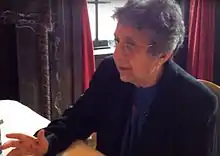
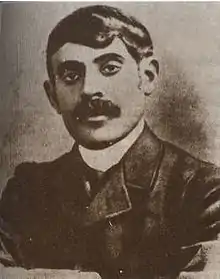
_(cropped).jpg.webp)
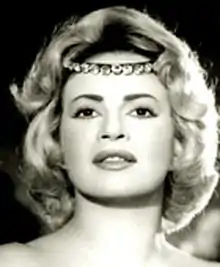
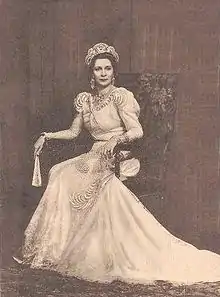
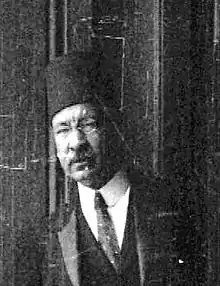
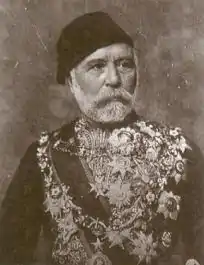
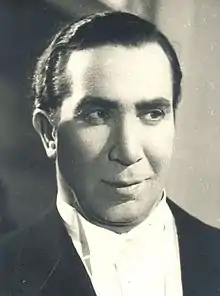
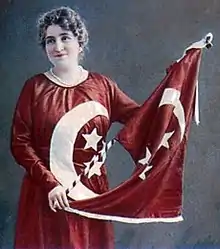
- Velia Abdel-Huda ("Princess Lulie"), the first Muslim woman to study at Oxford University[28][29]
- Muhammad Abduh, religious scholar and liberal reformer[30]
- Adel Adham, actor[31]
- Ismail Adham, writer and scholar
- Mohamed Fahim ElGuindy, Artist and furniture maker
- Eqbal Afifi, wife of Anwar Sadat[32]
- Tatamkulu Afrika, poet[33]
- Zakariyya Ahmad, musician[34]
- Ibrahim Ahmed, artist[35]
- Shajar al-Durr, the second Muslim woman to become a monarch in Islamic history
- Somaya El Alfy, actress[36]
- Tawfiq al-Hakim, writer[37]
- Leila Ahmed, writer[38]
- Ismail Mustafa al-Falaki, astronomer and mathematician[39]
- Tawfiq al-Hakim, writer[37]
- Mustafa Lutfi al-Manfaluti, writer[40]
- Mervat Amin, actress[36]
- Qasim Amin, women's rights activists[15]
- Marwan Anwer, musician[41]
- Azza Badr, writer and journalist
- Hoda Badran, Chairperson of the Alliance for Arab Women[42]
- Ali Bahjat, archaeologist and historian[43]
- Khair Bey
- Hussein Bikar, painter[44][45]
- Nonie Darwish, human rights activist[46]
- Nabila Ebeid, actress[36]
- Nawal El Saadawi, feminist.[47][48]
- Mai Ezz Eldin, actress[49][36]
- Abbas II of Egypt, Khedive of Egypt[50]
- Ali Kamel Fahmi, prince (murdered by his wife Marguerite Alibert)[51]
- Mustafa Fahmi, Prime Minister of Egypt[52]
- Abdel Rahman Fahmy, writer[53]
- Ashraf Fahmy, actor
- children:
- Jala Fahmy, actress[36]
- Mohammad Farid, nationalist leader, writer and lawyer[54]
- Hussein Fakhry, minister of education & Prime Minister of Egypt[55]
- Hassan Fathy, architect[56]
- Laila Fawzi, Miss Egypt (1940) & actress[57][58]
- Mohamed Fawzi, musician[59]
- Dodi Fayed, film producer & last companion of Diana, Princess of Wales[60]
- Mustafa Fazıl, Prince
- children:
- Ismail Fazıl, Ottoman and Turkish politician
- Nazli Fazil, Princess[61]
- Ola Ghanem, actress[36]
- Mahmud Tahir Haqqi, writer[62]
- Yahya Haqqi, writer[62]
- Aziza Shukri Hussein, social welfare expert[63]
- Ahmed Hussein, social scientist, reformer, and ambassador to the United States[64]
- Hafez Ibrahim, poet[65]
- Ekmeleddin İhsanoğlu, former Secretary-General of the Organisation of the Islamic Conference[16]
- Khalid Islambouli, army officer[66]
- Muhammad 'Uthman Jalal, writer[67]
- Shaykh ‘Abd al-’Aziz Jawish, educator[68]
- Yakup Kadri Karaosmanoğlu, writer[69]
- Omar Kahhala, scholar[70]
- Ahmed Kamal, Egyptologist[71]
- Seheir Kansouh, writer[72]
- Shahin Kinjm, soldier and statesman[73]
- Kasim Kutay, CEO of Novo Holdings A/S
- Amin Maalouf, writer[74]
- Ahmed Magdy, actor[75]
- Shahinda Maklad, Secretary of Peasant Affairs in the Tajamu Party[76]
- Şemsettin Mardin, Turkish ambassador to Lebanon
- Nihal Mazloum, jeweler and artisan[77]
- Ahmad Mazlum, cabinet minister and parliamentary leader[78]
- Abdul Muhammad, religious reformer and writer[79]
- Nabawiyya Musa, feminist[80]
- Cesa Nabarawi, feminist[80]
- Muhammad Naji, painter[81]
- Muhammad Tawfiq Nasim, Prime Minister of Egypt[82]
- Sherine Seif El Nasr, actress[83]
- Mahmoud El Nokrashy, second prime minister of the Kingdom of Egypt[84]
- Nermin Nazim, television news anchor, show host, and poet[85]
- Wedad Orfi, filmmaker[86]
- Isma'il Pasha, Khedive of Egypt[87]
- Tewfik Pasha
- Tusun Pasha
- Poussi, actress[36][88]
- Muhammad Qadir, judge and writer[89]
- Noura Qadry, actress[88]
- Ihsan Abdel Quddous[90]
- Ahmed Rami, poet[91]
- Bahigah Rashid, women's rights activists[92]
- Dawoud Rateb, labor union leader[93]
- Fawzia A. Reda, painter, theatre artist and graphic designer[94]
- Hussein Refki, war minister and senator[95]
- Hussein Riad, actor[96]
- Muhammad Rifat, historian and minister of education[97]
- Hind Rostom, actress[17][18][19]
- Rojina, actress[36]
- Zaki Rostom, actor
- Hussein Rushdi, Prime Minister of Egypt[98]
- Ali Sabri, Prime Minister of Egypt[98]
- Nazli Sabri, first Queen of Egypt[20]
- children:
- Faika of Egypt
- Farouk of Egypt, King of Egypt and the Sudan[99]
- Fawzia Fuad of Egypt, Queen of Iran
- Fathia Ghali
- Faiza Rauf
- Sherif Sabri, politician[20]
- Muhammad Said, Prime Minister of Egypt[100]
- children:
- Mahmoud Sa'id, painter
- Ismail Sadiq, Minister of Finance[101][102]
- Hussein Salem, businessman[103]
- Abdel Khalek Sarwat, Prime Minister of Egypt[21]
- Zeinab Sedky, actress[104]
- Huda Sha'arawi, pioneering Egyptian feminist leader[80]
- Ahmed Zaki Abu Shadi, poet[105]
- Elham Shahin, actress[36]
- Muhammad Sharif, Prime Minister of Egypt[24]
- Ahmed Shawqi, writer[106][107]
- Farid Shawqi, actor[108][36]
- children: Rania Farid Shawqi[36]
- Shadia, actress[22][23]
- Fouad Shafiq, actor[96]
- Sherihan, actress[36]
- Hanaa El Shorbagy, actress[36]
- Shwikar, actress[108]
- Suzanne Spahi, artist[109]
- Huda Sultan, actress[59]
- Halil Şerif ("Khalil-Bey"), diplomat and art collector[110]
- Ibn Taghribirdi
- Laila Taher, actress[36]
- Muhammed Taher, the "father" of the Mediterranean Games[111]
- Ahmed Talaat, aristocrat notable for donating 70,000 books to the National Library[112]
- Zein Al-Sharaf Talal, Queen of Jordan[113]
- Ismail Jabal Tareq, first fleet admiral of the Egyptian navy[114]
- Ahmed Taymour, writer[115]
- Aisha Taymur, writer[116]
- Mahmoud Teymour, writer[117]
- Muhammad Taymur, playwright[118]
- Zubaida Tharwat, actress[119]
- Hanan Tork, actress[36]
- Dina Torkia, fashion designer and blogger[120]
- Ahmad ibn Tulun, founder of the Tulunid dynasty[121]
- Hasan Husni al-Tuwayrani, writer[122]
- Youssef Wahbi, actor[25]
- Adham Wanly, painter
- Seif Wanly, painter[123]
- Adly Yakan, Prime Minister of Egypt[124]
- Muhammad Wali al-Din Yakan, writer[125]
- Nil Yalter, artist[126]
- Madiha Yousri, actress[127]
- Rose al Yusuf, actress and journalist[128]
- Safiya Zaghloul, political activist dubbed "Umm Al-Masryeen" ("the Mother of Egyptians")[27][26]
- Ahmed Zaher, actor[108][129]
- Maurice Zilber, horse trainer[130]
- Youssef Zulficar, judge and father-in-law of Farouk of Egypt[131]
- children:
- Farida of Egypt, Queen of Egypt[132]
See also
| Wikimedia Commons has media related to Turks in Egypt. |
References
- Baring, Evelyn (1910), Modern Egypt, Cambridge University Press, p. 590, ISBN 1108025536
- DNA analysis proves that Egyptians are Ethnic North Africans not Arabs,
Only 17 percent of Egyptians are Arabs, while 68 percent of the indigenous population is from North Africa, four percent are from Jewish ancestry, three percent are of East African origins, another three percent from Asia Minor and three percent are South European.
- Milner, Alfred (1901). "England in Egypt: With additions summarizing the course of events to the close of the year 1898". Edward Arnold. p. 219. ASIN B0014V7JAI. Retrieved 7 May 2020.
- Douin, Georges (1927). La mission du Baron de Boislecomte, l'Egypte et la Syrie en 1833. Cairo: Royal Egyptian Geographical Society. p. 110. ASIN B00180UKI8. OCLC 1377895. Retrieved 7 May 2020.
- "American Board of Commissioners for Foreign Missions. Syria and the Holy Land. Extracts from a Communication of Mr.Smith, Dated at Beyroot". Missionary Herald. 1835. p. 130. Missing or empty
|url=(help) - "The church scholar's reading-book, selected from the Saturday magazine". The Saturday Magazine. 1840. p. 297. Missing or empty
|url=(help) - "Turks", Egypt: Lower Egypt, with the Fayûm and the peninsula of Sinai, Part 1 of Egypt: Handbook for Travellers, K. Baedeker, 1878, p. 52
- Hanley, Will (2017), Identifying With Nationality: Europeans, Ottomans, and Egyptians in Alexandria, Columbia University Press, p. 241, ISBN 978-0231542524
- Abdelrazek, Amal Talaat (2007), Contemporary Arab American women writers: hyphenated identities and border crossings", Cambria Press, p. 37, ISBN 978-1-934043-71-4
- Al-Wer, Enam (2006), "The Arabic-speaking Middle East", in Ammon, Ulrich (ed.), Sociolinguistics: An International Handbook of the Science of Language and Society, Volume 3, Walter de Gruyter, p. 1922, ISBN 3110184184
- Gamal, Gamal, Did the Turks sweeten Egypt's kitty?, Al-Ahram Weekly, retrieved 1 May 2018,
Today, the number of ethnic Turks in Egypt varies considerably, with estimates ranging from 100,000 to 1,500,000. Most have intermingled in Egyptian society and are almost indistinguishable from non-Turkish Egyptians, even though a considerable number of Egyptians of Turkish origin are bilingual.
- Rippin, Andrew (2008). World Islam: Critical Concepts in Islamic Studies. Routledge. p. 77. ISBN 978-0415456531.
- Akar, Metin (1993), "Fas Arapçasında Osmanlı Türkçesinden Alınmış Kelimeler", Türklük Araştırmaları Dergisi, 7: 94–95,
Günümüzde, Arap dünyasında hâlâ Türk asıllı aileler mevcuttur. Bunların nüfusu Irak'ta 2 milyon, Suriye'de 3.5 milyon, Mısır'da 1.5, Cezayir'de 1 milyon, Tunus'ta 500 bin, Suudî Arabistan'da 150 bin, Libya'da 50 bin, Ürdün'de 60 bin olmak üzere 8.760.000 civarındadır. Bu ailelerin varlığı da Arap lehçelerindeki Türkçe ödünçleşmeleri belki artırmış olabilir.
- National Geographic DNA Analysis: Egyptians population consists of super majority 68% Native North Africans, 17% Arabs, 4% Jewish Diaspora, 3% Eastern African, 3% Asia Minor, 3% Southern European
- Nelson, Cynthia (1996), Doria Shafik, Egyptian feminist: a woman apart, American Univ in Cairo Press, p. 27, ISBN 977-424-413-3,
Qasim Amin, the son of an aristocratic Turkish father and respectable middle-class Egyptian mother...
- "Who is presidential candidate İhsanoğlu?". Hürriyet Daily News. 2014. Retrieved 7 September 2017.
İhsanoğlu, who was born in Cairo in 1943
- Rym Tina Ghazal. "The Other Marilyn Monroe". Huffington Post. Retrieved 5 September 2017.
Of aristocratic Turkish & Arab roots, Rostom was born on November 11, 1931 in Alexandria as Nariman Hussein Murad...
- The Daily News Egypt (9 August 2011). "Egyptian screen legend, seductress Hind Rostom dies at 82". The Daily News Egypt. Retrieved 28 August 2011.
Born Nariman Hussein Murad on Nov. 11, 1931 in Alexandria to a middle-class Turkish father and an aristocratic mother, her parents separated shortly after she was born. She moved to Cairo with her father when she was nine and then later with her single mother a few years later.
- Hesham, Soha. "Hind Rostom (1929-2011) Egypt's Monroe". Al-Ahram. Retrieved 5 September 2017.
Rostom was born on 11 November 1929 in Alexandria to a Turkish father and an Egyptian mother.
- Rosten, David B (2015), "Queen Nazli Sabri", The Last Cheetah of Egypt: A Narrative History of Egyptian Royalty from 1805 to 1953, iUniverse, ISBN 978-1491779392,
Queen Nazli was a maternal granddaughter of Major-General Muhammad Sharif Pasha... Queen Nazli of Egypt was a remarkable woman. Nazli Sabry was born on June 25, 1894, in Alexandria, Egypt to an aristocratic French/Turkish family with deep roots in Egyptian history...After the death of King Fuad in 1936, Farouk became the new king of Egypt, and she became the queen mother. Queen Nazli's brother Sherif Sabri Pasha served on the three-member regency.
- Rizk, Yunan Labib (2000), A Diwan of contemporary life (351): Ads: Mirror and catalyst, Al-Ahram, retrieved 18 September 2017,
Perhaps the only exception to this phenomenon were such figures as Adli Yakan, Hussein Rushdi and Abdel-Khaleq Tharwat, all hailing from the Turkish aristocracy who never wore traditional Egyptian garb in the first place.
- Landau, Jacob M. (2016), Studies in the Arab Theater and Cinema, Routledge, p. 190, ISBN 978-1317246275,
Shadiya deserves some mention. Born to a family of Turkish origin, she was a cabaret singer whose rise on the screen was meteoric...
- Hammond, Andrew (2005), Pop Culture Arab World!: Media, Arts, and Lifestyle, ABC-CLIO, p. 137, ISBN 1851094490
- Goldschmidt, Arthur (2000), "Sharif, Muhammad", Biographical Dictionary of Modern Egypt, Lynne Rienner Publishers, p. 191, ISBN 1-55587-229-8,
He mixed well with Europeans and was scrupulously honest, but was extremely proud of his Turkish background...
- Landau, Jacob M. (2016), Studies in the Arab Theater and Cinema, Routledge, p. 81, ISBN 978-1317246275,
More renowned in Egypt (and, particularly, in the other Arab lands) are Yusuf Wahbi and his confederates...He was born in a well-to-do Egyptian family of Turkish origin.
- House of the Nation, Al-Ahram, 2012,
Safiya Zaghloul herself played an important role in Egypt's political movement. Of Turkish origin and the daughter of Mustafa Pasha Fahmi (who formed the cabinet five times), she mobilised Egyptian ladies to stage a demonstration during the 1919 revolution. This was the first time that Arab women participated in such a politically- oriented movement, and for that she was called Umm Al-Masryeen, the Mother of Egyptians.
- Goldschmidt 2000, 235.
- Sarin, Sophie (2013), "Princess Lulie Flamboyant: Art historian and friend of Freya Stark and Anthony Blunt", The Independent, retrieved 20 September 2017,
Princess Velia Osman-Oglu of Turkey, known to all as Lulie, was the first Muslim woman to study at Oxford and to penetrate the British Establishment...She was born Velia Abdel-Huda in Cairo into a family of Turkish aristocrats and diplomats exiled in Egypt since the fall of the Ottoman Empire.
- May, Alex (2013), Obituaries 2012: Princess Princess Lulie 26 January 1916 – 29 November 2012, Oxford Today, University of Oxford, retrieved 20 September 2017,
Velia Abdel-Huda, otherwise known as Princess Lulie, died on 29 November 2012, aged 96. She was born in Cairo into a distinguished Turkish family with long experience of service to the Ottoman emperors; her father was later Prime Minister of Transjordan.
- Adams, Charles Clarence (1933), "Muhammad Abduh: Biography", Islam and Modernism in Egypt, Volume 10, Taylor & Francis, p. 18, ISBN 0415209080,
True, his father 'Abduh ibn Hasan Khair Allah, came from a family of Turkish origin that had settled in the village of Mahallat Nasr in the Buhairah Province at some remote time in the past...
- عادل أدهم.. "تاجر القطن" الذي أصبح "برنس السينما العربية", Al-Hayat, 2014, retrieved 6 September 2017,
نشأته: ولد عادل أدهم في حي الجمرك البحري بمدينة الإسكندرية لأب يعمل موظفاً حكومياً كبيراً، وأم ذات أصول تركية ورثت عن أبيها “شاليه” يطل على البحر في منطقة سيدي بشر، انتقلت الأسرة للإقامة فيه حينما كان عادل لايزال في المدرسة الابتدائية. وكان في صغره يقلد رعاة البقر، إذ يرتدي قبعاتهم ويلهو بالمسدسات، مقلداً أدوار الشرير في أفلام «الكاوبوي» الأميركية.
- Finklestone, Joseph (2013), Anwar Sadat: Visionary Who Dared, *Routledge, ISBN 978-1135195656,
Significantly, Anwar Sadat did not mention aspects in his early life...It was in Mit Abul-Kum that Eqbal Afifi, the woman who was his wife for ten years and whom he left, was also born. Her family was of higher social standing than Anwar's, being of Turkish origin...
- Olaussen, Maria; Angelfors, Christina (2009), Africa writing Europe: opposition, juxtaposition, entanglement, Rodopi, p. 88, ISBN 978-90-420-2593-6,
Afrika was born in Egypt in 1920 to a Turkish father and Egyptian mother, who moved to South Africa when Africa was two.
- Goldschmidt, Arthur (2000), "Ahmad, Zakariyya", Biographical Dictionary of Modern Egypt, Lynne Rienner Publishers, p. 17, ISBN 1-55587-229-8,
Singer and composer. Born in Cairo to an Egyptian father and a Turkish mother...
- Klein, Alyssa (2016), A Cairo Art Story: On Moving To Egypt And The Hoax Of Authenticity, OkayAfrica, retrieved 24 September 2017,
To answer for myself, I claim myself as an African, and it’s just the tip of my identity. I’m African. I also have Arabness in me. I know for a fact I have Turkish blood. It’s very complex, our identity, and so is Africa. Africa is very complex. It’s all these things.
- اصول وجنسيات مشاهير الفنانين العرب, Arab Times, 2017, retrieved 10 September 2017
- Goldschmidt, Arthur (2000), "al-Hakim, Tawfiq", Biographical Dictionary of Modern Egypt, Lynne Rienner Publishers, p. 52, ISBN 1-55587-229-8,
Playwright, novelist, and essayist. Tawfiq was born in Ramleh, Alexandria, to an Egyptian landowning father and an aristocratic Turkish mother.
- Abdelrazek, Amal Talaat (2007), Contemporary Arab American women writers: hyphenated identities and border crossings, Cambria Press, p. 21, ISBN 978-1-934043-71-4,
Born in 1940 in Cairo, Leila Ahmed was the child of an upper middle-class Egyptian father and an upper-class mother of Turkish ancestry.
- Goldschmidt, Arthur (2000), "al-falaki, Isma'il Mustafa", Biographical Dictionary of Modern Egypt, Lynne Rienner Publishers, p. 52, ISBN 1-55587-229-8,
Astronomer and mathematician. Of Turkish origin, he was born and reared in Cairo.
- Moosa, Matti (1997), The origins of modern Arabic fiction, Lynne Rienner Publishers, p. 109, ISBN 0-89410-684-8,
Al-Manfaluti was born in 1876 in Manfalut, Egypt, to an Arab father and a Turkish mother, both of fairly high social standing.
- Theme: Da'a Gedida, TED, 2012, retrieved 6 September 2017,
Marwan Anwer young talented man born in 1990 to an Egyptian family from a Turkish origin
- Badran, Hoda (2016), "My Road from Academe to Voluntary Work", in Spencer, Samia (ed.), Daughters of the Nile: Egyptian Women Changing Their World, Cambridge Scholars Publishing, p. 69, ISBN 978-1443844956,
My mother was an upper-class beautiful woman of Turkish descent...
- Goldschmidt, Arthur (2000), "Bahjat, Ali", Biographical Dictionary of Modern Egypt, Lynne Rienner Publishers, p. 32, ISBN 1-55587-229-8,
Archaeologist, Islamic art historianm and leading excavator or Fustat, Egypt's first Arab capital. Of Turkish extraction, he was born in the village of Bahat al-'Ajuz (in Beni Suef province).
- من هو حسين بيكار الذي يحتفل غوغل بميلاده اليوم؟, Al Arabiya, 2017, retrieved 6 September 2017,
ولد حسين أمين بيكار في 2 كانون الثاني /يناير من عام 1913، وتوفي في 16 نوفمبر 2002، وهو فنان تشكيلي مصري من أصل قبرصي تركي.
- Bahaiviews. "On Baha'i Painters: Hussein Bikar and the Treatment of Baha'is in Egypt". Retrieved 4 February 2011.
- Darwish, Nonie (2006), Now They Call Me Infidel: Why I Renounced Jihad for America, Israel, and the War on Terror, Penguin Books, ISBN 1101217855,
My father came from a large middle-class Egyptian family. Born in 1920,...His father was of Turkish ancestry and his mother's family was rooted in the Egyptian delta.
- Nawal El Saadawi (2013), A Daughter of Isis: The Early Life of Nawal El Saadawi, Zed Books, ISBN 978-1848136403
- Nawal El Saadawi (1986), Memoirs from the Women's Prison, University of California Press, p. 64, ISBN 0520088883,
My eyes widened in astonishment. Even my maternal grandmother used to sing, although she was born to a Turkish mother and lived in my grandfather's house in the epoch when harems still existed.
- منهم ليلى علوي وعمرو ذياب:20 فناناً وفنانة أصولهم ليست مصرية, Al Chourouk, retrieved 10 September 2017,
مي عز الدين: ولدت ماهيتاب حسين عز الدين وهبة عبدالله في أبو ظبي بالإمارات عام 1980، وتربت في مدينة الإسكندرية، ولدت لأسرة ذات أصول تركية، حيث أن جدتها تركية
- Brugman, J. (1984), An introduction to the history of modern Arabic literature in Egypt, BRILL, pp. 40, 263, ISBN 90-04-07172-5
- Rizk, Yunan Labib (2000), A Diwan of contemporary life (335): Warped justice, Al-Ahram,
Ali Kamel Fahmi...Belonging to the upper class of notables most of whom were of Turkish origin,
- Goldschmidt, Arthur (2000), "Fahmi, Mustafa", Biographical Dictionary of Modern Egypt, Lynne Rienner Publishers, p. 51, ISBN 1-55587-229-8,
Politician, cabinet minister, and twice premier. He was born in Crete to a Turkish family that had earlier settled in Algeria.
- Manzalaoui, Mahmoud (1986), Arabic short stories, 1945-1965, American University in Cairo Press, p. 193, ISBN 977-424-121-5,
Abdel Rahman Fahmy says that he is half Ethiopian and half Turkish by blood...
- Goldschmidt, Arthur (2000), "Farid, Muhammad", Biographical Dictionary of Modern Egypt, Lynne Rienner Publishers, p. 53, ISBN 1-55587-229-8,
Nationalist leader, writer and lawyer. Farid came from a landowning family of Turkish origin.
- Reid, Donald Malcolm (2015), Contesting Antiquity in Egypt: Archaeologies, Museums, and the Struggle for Identities from World War I to Nasser, The American University in Cairo Press, p. 175, ISBN 978-9774166891,
Husayn Fakhri, the long-serving Turkish minister of education...
- El-Rashidi, Yasmine (2000), Remembering 'the Master', Al-Ahram, retrieved 16 September 2017,
1900 Born in Alexandria to an Upper Egyptian father and Turkish mother
- Ahmed, Doaa (2017), Egyptian Beauty Queens of La Belle Epoque, Women of Egypt Mag, retrieved 6 September 2017,
Laila Fawzy was born in Turkey to an Egyptian father and a Turkish mother. Her father owned fabric stores in Cairo, Damascus and Istanbul. She won Miss Egypt contest in 1940 and was awarded a small role in the movie Wives Factory in 1941.
- Laila Fawzy (1918 - 2005), El Cinema, retrieved 6 September 2017,
Laila Fawzy was an Egyptian actress. She was born in 1918 to a Syrian father and a Turkish mother.
- Egyptian Musical Actress Huda Sultan, 81, Dies, Arab News, 2006, retrieved 10 September 2017,
Huda’s original name is Bahija Abdul Aal Baho, and she was born on Aug. 15, 1925 to an Egyptian father and a Turkish mother. She is also the sister of the late artist Mohammad Fawzi.
- Bradford, Sarah (2007), Diana, Penguin, ISBN 978-0141906737,
Fayed had risen from his lowly beginnings through his connection with the Kashoggi family, Saudis of Turkish descent, who owned their position to their connection with the rulers of Saudi Arabia. In 1954 he had married Samira, the sixteen-year-old sister of Adnan Kashoggi, his contemporary, son of the head of the family Dr Mohamed Kashoggi. Their son, Emad, always known as 'Dodi', had been born in 1955...
- Labidi, Lilia (2017), "Tunisian Women's Literature of Denunciation", in Badri, Balghis; Tripp, Aili Mari (eds.), Women's Activism in Africa: Struggles for Rights and Representation, Zed Books, ISBN 978-1783609116,
The Egyptian Princess Nazli Fadhel (1853–1913), of Turkish origin, started literary salons in Egypt.
- Brugman, J. (1984), An introduction to the history of modern Arabic literature in Egypt, BRILL, p. 263, ISBN 90-04-07172-5,
Yahya Haqqi was born in Cairo in the working quarter of Sayyidah Zaynab on January 7, 1905 in a Turco-Egyptian family...Yahya's uncle Mahmud Tahir Haqqi, the author of one of the early Egyptian novels,...
- Goldschmidt, Arthur (2000), "Husayn, 'Aziza Shukri", Biographical Dictionary of Modern Egypt, Lynne Rienner Publishers, p. 80, ISBN 1-55587-229-8,
Social welfare expert and leading advocate of family planning. Born in zifta to an Egyptian father (a surgeon) and a Turkish mother...
- Johnson, Amy J. (2004), Reconstructing rural Egypt: Ahmed Hussein and the history of Egyptian development, Syracuse University Press, p. 1, ISBN 0-8156-3014-X,
Aimed Hussein was born in November 1902 in Helwan, a southern suburb of Cairo, to Ali Hussein Pasha and Khadija al-Nagdaliya. Ali Hussein Pasha and his family were originally from Upper Egypt, while Ahmed's mother's family was of mixed Tunisian and Turkish descent.
- Badawī, Muḥammad Muṣṭafá (1975), A critical introduction to modern Arabic poetry, Cambridge University Press, p. 42, ISBN 0-521-29023-6,
Hafiz was of mixed origin: his father was an Egyptian engineer and his mother Turkish.
- Goldschmidt, Arthur (2000), "al-Islambuli, Khalid", Biographical Dictionary of Modern Egypt, Lynne Rienner Publishers, p. 90, ISBN 1-55587-229-8,
Khalid was born in Mallawi (near Minya). His father was a legal adviser to the nationalized sugar reginery in Naj 'Hammadi and his mother was of Turkish extraction.
- Landau, Jacob M. (2016), Studies in the Arab Theater and Cinema, Routledge, p. 108, ISBN 978-1317246275,
One of the most prolific of the adapters was Muhammad 'Uthman Jalal (called by his Egyptian compatriots Galal). The son of a minor official of Turkish ancestry who had married an Egyptian woman
- Goldschmidt, Arthur (2000), "Jawish, Shaykh 'Abd al-'Aziz", Biographical Dictionary of Modern Egypt, Lynne Rienner Publishers, p. 96, ISBN 1-55587-229-8,
Pan-Islamic journalist, orator, and educator, sometimes called Shaykh Shawish. He was born in Alexandria to a Tunisian father and a Turkish mother...
- Boyar, Ebru; Fleet, Kate (2010), A Social History of Ottoman Istanbul, Cambridge University Press, p. xv, ISBN 978-1139484442,
Karaosmanoğlu, Yakup Kadri Born Cairo 1889, died Ankara 1944. Writer, diplomat, politician.
- Mernissi, Fatema (2001), Scheherazade Goes West: Different Cultures, Different Harems, Simon and Schuster, p. 199, ISBN 1139484443,
Omar Kahhala, an Egyptian scholar of Turkish origin...
- Reid, Donald Malcolm (2015), Contesting Antiquity in Egypt: Archaeologies, Museums, and the Struggle for Identities from World War I to Nasser, The American University in Cairo Press, p. 171, ISBN 978-9774166891,
Ali Bahgat, like Ahmad Kamal, was of Turkish extraction...
- Kansouh, Seheir (2016), "My Country and me", in Spencer, Samia (ed.), Daughters of the Nile: Egyptian Women Changing Their World, Cambridge Scholars Publishing, p. 226, ISBN 978-1443844956,
Having sketched the historical background that affected Egypt during my lifetime, I will now focus on my own story... I am of Turkish-Circassian descent.
- Carstens 2014, 612.
- Esposito, Claudia (2013), The Narrative Mediterranean: Beyond France and the Maghreb, Lexington Books, p. 36, ISBN 978-0739168226,
born into a culturally composite family - his mother was Egyptian of Turkish origin, his father a Greek Catholic 0 in 1949 in Lebanon...
- Ouaglal, Djamel (2009), InfoSoir s'invite chez les Magdy, L'exemple de réussite d'une famille mixte, Info Soir, retrieved 5 August 2017,
Ahmed Magdy semble très fier, même s'il se sent beaucoup plus Egyptien. «Je trouve que c'est un privilège d'être doté d'une double nationalité. Il faut savoir que ce n'est pas un fait nouveau chez nous. Ma grand-mère paternelle est d'origine turque et mon grand-père est Egyptien, alors que mes grands- parents du côté maternel ont des origines arabe et berbère.
. - Ansari, Hamied (1986), Egypt: The Stalled Society, SUNY Press, p. 27, ISBN 0887061842,
It is not surprising, then, that when the army seized power in 1952, Salah Husain Maqlad and his wife Shahinda - named after her Turkish ancestor - became the principle organizers of the Kamshish peasants against the Fiqqis. (Family tree page 25)
- Nihal Mazloum, Canadian Museum of History, 2000, retrieved 20 September 2017,
Of Turkish-Egyptian ancestry, Nihal Mazloum was born in Paris in 1951 and grew up in Cairo, in an affluent and multilingual family. After receiving a Bachelor's degree in anthropology from Cairo's American University, she left Egypt to study ethnology in Paris. She remained there for seven years and then immigrated to Canada in 1978. She lives in Montreal.
- Goldschmidt, Arthur (2000), "Mazlum, Ahmad", Biographical Dictionary of Modern Egypt, Lynne Rienner Publishers, p. 128, ISBN 1-55587-229-8,
Cabinet minister and parliamentary leader. Ahmed Mazlum was born in Cairo, the child of a Turkish landowning family...
- Carstens 2014, 13.
- Zénié-Ziegler, Wédad (1988), In Search of Shadows: Conversations with Egyptian Women, Zed Books, p. 112, ISBN 0862328071,
The Federation of Egyptian Women was founded by a middle-class woman of Turkish origin, Huda Shaarawi. In 1923, she and two of her fellow activists, Cesa Nabarawi and Nabawiya Moussa, also of Turkish origin...
- Goldschmidt, Arthur (2000), "Naji, Muhammad", Biographical Dictionary of Modern Egypt, Lynne Rienner Publishers, p. 150, ISBN 1-55587-229-8,
Painter. Of Turkish and Egyptian extraction (his father was an army officer).
- Goldschmidt, Arthur (2000), "Nasim, Muhammad Tawfiq", Biographical Dictionary of Modern Egypt, Lynne Rienner Publishers, p. 153, ISBN 1-55587-229-8,
Politician, minister, and premier. Of Anatolian Turkish origin, Nasim was born in Cairo...
- منهم ليلى علوي وعمرو ذياب:20 فناناً وفنانة أصولهم ليست مصرية, Al Chourouk, retrieved 10 September 2017,
شيرين سيف النصر: ولدت شيرين سيف النصر عام 1967، لأب مصري ذو أصول تركية، وأم فلسطينية من آل هاشم النابلسيين في مدينة نابلس بفلسطين.
- Akyeampong, Emmanuel; Gates, Henry Louis, eds. (2012), "Nuqrashi, Mahmud Fahmi al", Dictionary of African Biography, Oxford University Press, p. 508, ISBN 978-0195382075,
Nuqrashi, Mahmud Fahmi al- (1888–1948), Egyptian politician and educator, was born ... His father was an Egyptian accountant for the Khedivial mail, and his mother, Hanifa, was of Turkish origin.
- Nazim, Nermin (2000), Sky above the Nile, Lulu, p. 113, ISBN 1446186490,
Nermin Nazim is a television news anchor, show host and poet. She is of Turkish-Egyptian descent and lives in Cairo, Egypt.
- Armes, Roy (2008), "Orfi, Wedad", Dictionary of African Filmmakers, Indiana University Press, p. 105, ISBN 978-0253351166,
Egyptian silent filmmaker of Turkish origin.
- Lababidi, Lesley Kitchen (2008), Cairo's street stories: exploring the city's statues, squares, bridges, gardens, and sidewalk cafés, The American University in Cairo Press, p. 37, ISBN 978-9774161537,
Ismail Pasha (viceroy, then khedive of Egypt from 1863 to 1879)... Turkish himself (though born in Egypt)...
- Egyptian Poussy back in action after a short break, Al Bawaba, 2017, retrieved 10 September 2017,
Poussy is the sister of actress Noura. Who was born as Serfenaz Moustafa Qadry. Poussy started her acting career working in films and on stage. The actress, married to Nour El Sharif, comes from a long line of aristocracy. Her grandmother is one of the Turkish aristocrats who moved to Egypt in the middle of the last century.
- Goldschmidt 2000, 159.
- معلومات نادرة عن إحسان عبد القدوس, Cairo Dar, 2015, retrieved 6 September 2017,
وكأي صبي مدلل ومنعم تربى بين أحضان والده محمد عبد القدوس ووالدته التركية الأصل روزا اليوسف مؤسسة دار روز اليوسف بعيدا عن صخب المدينة وضجيجها.
- "رباعيات الخيام" ترجمة أحمد رامي في طبعة جديدة, Al-Mustaqbal, 2006, retrieved 6 September 2017,
والمعروف أن رامي هو من أصل تركي وجده سكن القاهرة منذ القرن التاسع عشر.
- Badran, Margot (1996), Feminists, Islam, and Nation: Gender and the Making of Modern Egypt, Princeton University Press, p. 97, ISBN 1400821436,
Bahigah Rashid, another early member, was born in 1900 in Cairo...Bahigah was of Turkish ancestry on her mother's side...
- Rizk, Yunan Labib (2003), A Diwan of contemporary life (493): Birth of Labour, Al-Ahram, retrieved 18 September 2017,
Rateb belonged to a wealthy family of the Turkish aristocracy...
- Oweis, Fayeq (2008), "Fawzia A. Reda", Encyclopedia of Arab American Artists, ABC-CLIO, p. 220, ISBN 978-0313337307,
Fawzia A. Reda (b.1948), Painter, Theatre Artist and Graphic Designer... Fawzia A. Reda was born in Egypt to a half-Lebanese, half-Palestinian father and a Turkish mother.
- Soria, L. Blattner, E.J. Le Mondain Egyptien (The Egyptian Who's Who): L'Annuaire De L'Elite D'Egypte. 1936. Cairo: Thuilot Vincent & Cie.
- (حسين رياض (1897 - 1965), El Cinema, retrieved 25 September 2017,
ولد (حسين محمود شفيق) في حي السيدة زينب بالقاهرة لأم سوريّة وأب مصري ميسور الحال يعمل بتجارة الجلود، وهو سليل أسرة تركية ترجع أصولها لحكام جزيرة (كريت).
- Gorman, Anthony (2012), Historians, State and Politics in Twentieth Century Egypt: Contesting the Nation, Routledge, pp. 22–23, ISBN 978-1135145330,
Muhammad Rifat was from an aristocratic Turkish family...By 1952 he held the title of Pasha and was appointed the Minister of Education...
- Goldschmidt 2000, 169.
- Laçiner, Sedat (2011), "The Democratic Foreign Policy Approach (1950-1960)", TUSAK Yearbook of International Politics and Law: Volume 4, International Strategic Research Organization, p. 132, ISBN 978-6054030477,
Egyptian King Fuad and his son King Faruk were half-Turkish. In the Fuad era, the Turkish language was the Palace language in Egypt. Though Faruk had banned the use of Turkish in the Palace, Turkish blood was the primary indication of noble birth in Egypt,...
- Goldschmidt, Arthur (2000), "Sa'id Muhammad", Biographical Dictionary of Modern Egypt, Lynne Rienner Publishers, p. 178, ISBN 1-55587-229-8,
Politician, cabinet minister, and twice premier. Born in Alexandria to a family of Turkish origin...
- Carstens 2014, 358.
- Hill, Richard Leslie (1967), A Biographical Dictionary of the Sudan, Frank Cass & Co Publishers, p. 187, ISBN 0714610372,
Ismail Pasha Sadiq ( - 1876), Egyptian statesman, a native of Asyut by a Turkish father and an Egyptian mother...
- Yehia, Karem (2011), Hussein Salem: A businessman from the times of crony capitalism, Al-Ahram, retrieved 5 September 2017,
Moreover, after the death of his father, who was a school teacher, Salem took on the responsibility of working and providing for his mother (Hosnia Tabozada who was of Turkish origins and Salem’s father’s second wife) and his two siblings - his older sister Thuraiya and his brother Rafiq, 10 years his junior.
- زينب صدقي, El Cinema, retrieved 6 September 2017,
هي ممثلة مصرية من أصل تركي،
- Harker, Leonard S. (1938), Blazing the Trail: Reminiscences of A.Z. Abushády, Poet--bee-master--humanist, C.W. Daniel Company Limited, p. 6
- Goldschmidt, Arthur (2013), "Shawqi, Ahmad", Historical Dictionary of Egypt, Scarecrow Press, p. 381, ISBN 978-0810880252,
Distinguished Arabic poet and playwright, often called Amir al-shu'ara (Prince of Poets). He came from a wealthy family of mixed Turkish, Arab, Kurdish, and Greek origin that was closely connected to the khedivial family.
- Brugman 1984, 35.
- Ashraf Abdel Hamid (2016), هل تصدق أن هؤلاء النجوم ليسوا من أصول مصرية؟, Al Arabiya.
- Spahi, Suzanne (2016), "My Journey into Mosaics: Turning a Childhood Fantasy into Fine Artistic Work", in Spencer, Samia (ed.), Daughters of the Nile: Egyptian Women Changing Their World, Cambridge Scholars Publishing, p. 329, ISBN 978-1443844956,
It is true that your early years are what shapes you. My parents have Turkish, Syrian, and Tunisian roots, but were born in Egypt.
- Gustave Courbet: The Origin of the World, Musée d'Orsay, retrieved 20 September 2017,
The first owner of The Origin of the World, who probably commissioned it, was the Turkish-Egyptian diplomat Khalil-Bey (1831-1879).
- British Documents on Foreign Affairs: Reports and Papers from the Foreign Office Confidential Print. From 1945 through 1950. Africa, 1946-1950. Part IV. Series G, University Publications of America, 1999, ISBN 1556557701,
Mohammed Taher Pasha... Son of a former Turkish Minister at Stockholm, Mustafa Shebib Pasha,...
- Rizk, Yunan Labib (2002), A Diwan of contemporary life (424): Men of caliber, Al-Ahram, retrieved 18 September 2017,
Firstly, Talaat belonged to a prominent family of the Turkish aristocracy in Egypt...the most important reason that inspired the Al-Ahram biography was Talaat's bequeathal of his collection of 70,000 books to the national public library.
- هذه الاميرة كان طلال يحبها وكان من الممكن ان تكون اما للملك حسين ولو لم تقتل الملكة زين الملكة علياء طوقان لربما تغير وجه الاردن, Arab Times, retrieved 6 September 2017,
بخاصة بعد أن اجبر الملك عبدالله ابنه طلال على الزواج من تركية ولدت في مصر اسمها زين وهي أم الملك حسين ...
- Who's who, Al-Ahram,
Ismail Jabal Tareq (Gibraltar): The first fleet admiral of the Egyptian navy. Of Turkish origin,...
- أحمد تيمور باشا.. مصحح أغلاط لسان العرب, Al Jazeera,
ولد أحمد توفيق بن إسماعيل بن محمد كاشف تيمور عام 1871 في العاصمة المصرية القاهرة لأب كردي وأم تركية.
- Goldschmidt, Arthur (2000), "al-Taymuriyya, 'Aisha", Biographical Dictionary of Modern Egypt, Lynne Rienner Publishers, p. 211, ISBN 1-55587-229-8,
Pioneer woman poet, writer, and feminist. Born in Bab al-Khalq, Cairo, she was the daughter of Isma'il Taymur, a Turkish-born official in Muhammad Ali's European chancery, and an upper-class Circassian women who tried to quash Aish'a literary leanings.
- Johnson-Davies, Denys, ed. (2014), Homecoming: Sixty Years of Egyptian Short Stories, The American University in Cairo Press, p. 341, ISBN 978-9774166549,
Mahmoud Teymour was born in 1894 into an aristocratic Egyptian family of Turkish origin and is today regarded as the pioneer writer of the Arabic short story.
- Badawi, Muhammad Mustafa (1998), Early Arabic Drama, Cambridge University Press, p. 101, ISBN 0521344271,
Taymur was born to a rich aristocratic family of Turkish origin with several distinguished members in the world of learning and letters. His father, Ahmad Taymur Pacha, was a renowned Arabic scholar... his aunt, Aisha, was one of the earliest women writers of note in modern Arabic literature while his younger brother, Mahmud, became a leading novelist and dramatist in the Arab world.
- "خر اعترافات زبيدة ثروت / إنها تركية الأصل وجدتها هي الأميرة زبيدة". Al Mawed. 2015. Retrieved 5 October 2017.
ايوه، والدي تركي الأصل ولكنه مولود في مصر!.
- Toki-O, Dina, Reflections on Being Bicultural, Aquila Style,
This week, I’d like to tell it all. I want to share with you the connections I have with both my countries and my experience being a hybrid, bicultural Muslim woman living in the West. My father is Egyptian born and bred, with a fraction of Turkish from his mother’s (my grandmother’s) side. He married an English Liverpudlian revert (my mother), and they had four children together: twin daughters (me and my sister) and two sons (my two younger brothers).
- Raymond, André (2000), Cairo, Harvard University Press, p. 25, ISBN 0674003160,
A military man of Turkish ancestry, Ahmad ibn Tulun had lived in Mesopotamia, specifically in Samarra, where he served Caliph Musta'in (862-866) brilliantly, thus earning his appointment to Egypt...
- Booth, Marilyn (2015), Classes of Ladies of Cloistered Spaces, Edinburgh University Press, ISBN 978-1474403412,
writer Hasan Husni al-Tuwayrani (1849/50-97), a native-born Egyptian of Turkish origin active first in Ottoman journalistic circles and then in those of Cairo.
- Google celebrates memory of painter Seif Wanly, Daily News Egypt, 2015,
Wanly was born in Alexandria to a family of Turkish origin, he studied art at National Association of Fine Arts in Alexandria, afterwards he completed his studies at the studio of the Italian artist Otorino Becchi.
- Hollingworth, Clare (2015), The Arabs and the West, Routledge, p. 10, ISBN 978-1317414025,
The new prime minister, Adli Yeghen Pasha, one of the elite of Egyptians of Turkish descent...
- Goldschmidt 2000, 229.
- Genç, Kaya (2016), Leading contemporary artist returns to Istanbul with major new show, Daily Sabah, retrieved 24 September 2017,
Nil Yalter, a pioneering contemporary artist, was born in 1938 in Cairo to Turkish parents and has remained a migrant throughout her life.
- Al-Balani, Noura (2017), بالأسماء والصور: نجوم عرب من أصول تركية!, Al Jamila, retrieved 20 September 2017
- Al-Materi, Mohammed (2016), من قصص العشاق:"روز اليوسف" ... الصحافة... والرجال (1-3):تزوجت ثلاث مرات وأنجبت «إحسان عبد القدوس « الكاتب المصري المعروف, Al Chourouk, retrieved 6 September 2017,
وروز اليوسف (1897 - 1958)، ممثلة لبنانية من أصل تركي، ولدت في بيروت يتيمة الأم في أسرة مسلمة.
- منهم ليلى علوي وعمرو ذياب:20 فناناً وفنانة أصولهم ليست مصرية, Al Chourouk, retrieved 10 September 2017,
حمد زاهر: من مواليد عام 1975، لأسرة ذات أصول تركية وتحديدا من مدينة قونية وهو من أصل بشوات، التحق بكلية التجارة إلا أنه تركها في العام الثالث للالتحاق بالمعهد العالي للفنون المسرحية وتخرج.
- Independent (30 January 2009). "Obits in Brief: Maurice Zilber". The Independent. London. Retrieved 4 February 2011.
Born in Cairo to a French-Hungarian father and a Turkish mother, Zilber spent the first 15 years of his career in Egypt, where he saddled hundreds of winners.
- "British documents on foreign affairs: reports and papers from the Foreign Office confidential print. From 1945 through 1950. Africa, 1947. Africa, January 1947-December 1947, Part 4, Volume 3". University Publications of America. 2001. p. 187.
Yousef Zulficar Pasha Father-in-law of His Majesty King Farouk I. Born the 6th June, 1886. He belongs to one of those Turkish families whose ancestors came to Egypt with Mohammed Ali the Great, and which, since then, have constituted the nearest approach to an aristocracy in this country.
- Hassan, Fayza (2002), Sent away: Who was King Farouk, Al-Ahram, retrieved 18 September 2017,
Farouk was not given the time to enjoy his victory in the popularity contest. His mother had decided to increase her power over him by choosing his future wife. She selected a 15- year-old whose father was a judge of Turkish descent and whose mother was one of her own ladies-in-waiting. Safinaz (renamed Farida) was "a woman in her own image, a petite, beautiful brunette upper bourgeoise who spoke perfect French and had perfect manners and yet was not of royal blood.
Bibliography
- Abdelrazek, Amal Talaat (2007), Contemporary Arab American women writers: hyphenated identities and border crossings, Cambria Press, ISBN 978-1-934043-71-4
- Akar, Metin (1993), "Fas Arapçasında Osmanlı Türkçesinden Alınmış Kelimeler", Türklük Araştırmaları Dergisi, 7: 91–110
- Armes, Roy (2008), Dictionnaire des cinéastes africains de long métrage, KARTHALA Editions, ISBN 978-2-84586-958-5
- Badawī, Muḥammad Muṣṭafá (1975), A critical introduction to modern Arabic poetry, Cambridge University Press, ISBN 0-521-29023-6
- Badran, Margot (1996), Feminists, Islam, and nation: gender and the making of modern Egypt, Princeton University Press, p. 97, ISBN 0-691-02605-X
- Baedeker, Karl (2000), Egypt, Elibron, ISBN 1-4021-9705-5
- Baring, Evelyn (2005), Modern Egypt. Volume 2, Elibron, ISBN 1-4021-7830-1
- Brugman, J. (1984), An introduction to the history of modern Arabic literature in Egypt, BRILL, p. 263, ISBN 90-04-07172-5
- Carstens, Patrick Richard (2014), The Encyclopædia of Egypt during the Reign of the Mehemet Ali Dynasty 1798-1952: The People, Places and Events that Shaped Nineteenth Century Egypt and its Sphere of Influence, Friesen Press, ISBN 978-1460248997
- Asbridge, Thomas (2010). The Crusades: The War for the Holy Land. Simon and Schuster. ISBN 9781849837705.
- Clifford, Winslow William (2013). Conermann, Stephan (ed.). State Formation and the Structure of Politics in Mamluk Syro-Egypt, 648-741 A.H./1250-1340 C.E. Bonn University Press. ISBN 9783847100911.
- Goldschmidt, Arthur (2000), Biographical dictionary of modern Egypt, Lynne Rienner Publishers, ISBN 1-55587-229-8
- Iggers, Georg G.; Wang, Q. Edward; Mukherjee, Supriya (2008), A global history of modern historiography, Pearson Education, p. 196, ISBN 978-0-582-09606-6
- Johnson, Amy J. (2004), Reconstructing rural Egypt: Ahmed Hussein and the history of Egyptian development, Syracuse University Press, p. 1, ISBN 0-8156-3014-X
- Jongerden, Joost (2007), The settlement issue in Turkey and the Kurds: an analysis of spatial policies, modernity and war, BRILL, p. 193, ISBN 978-90-04-15557-2
- Lababidi, Lesley Kitchen (2008), Cairo's street stories: exploring the city's statues, squares, bridges, gardens, and sidewalk cafés, American University in Cairo Press, ISBN 978-977-416-153-7
- Manzalaoui, Mahmoud (1986), Arabic short stories, 1945-1965, American University in Cairo Press, p. 193, ISBN 977-424-121-5
- Moosa, Matti (1997), The origins of modern Arabic fiction, Lynne Rienner Publishers, p. 109, ISBN 0-89410-684-8
- Nelson, Cynthia (1996), Doria Shafik, Egyptian feminist: a woman apart, American Univ in Cairo Press, p. 27, ISBN 977-424-413-3
- Olaussen, Maria; Angelfors, Christina (2009), Africa writing Europe: opposition, juxtaposition, entanglement, Rodopi, ISBN 978-90-420-2593-6
